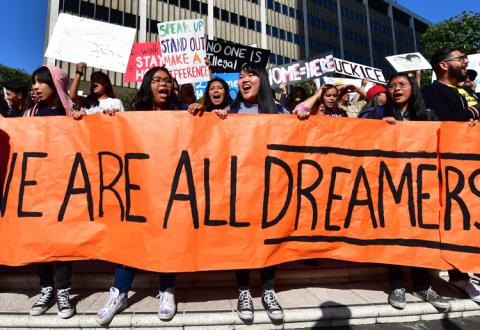By Sandra G. Leon
A Texas federal judge has again ruled that a program that allows undocumented immigrants brought to the US as minors to work legally violated immigration laws, but he did not halt the program.
Judge Andrew Hanen, appointed to the bench by President George W. Bush in 2002, first ruled that the Deferred Action for Childhood Arrivals (DACA) program violated US immigration law in July 2021 when he decided that the presidential memo issued by then-President Barack Obama did not establish a formal regulation.
Hanen’s ruling vacated Obama’s 2012 memo that created DACA, but the judge did not end the program, citing that existing DACA recipients have significant reliance in the program’s protections.
Undocumented immigrants brought to the US as minors, including applicants for DACA, are usually referred to as DREAMERS after a 2001 proposal known as the Development, Relief, and Education for Alien Minors (DREAM) Act, one of several similar unsuccessful proposals launched before Obama’s DACA program was instituted. The DREAM Act would have created a process for immigrants to apply for conditional residency with a path to permanent residency based upon their age at time of entry into the United States, failed after several attempts to pass it in Congress.
DACA allowed applicants under the age of 31 who entered the US by their 16th birthday to enroll for deferred deportation action, with other specific requirements, including that they were in school, graduated or obtained a certificate of complete from a high school, or have obtained a GED, or honorably discharged veteran of the Coast Guard or Armed Forces of the United States, and not have been convicted of a felony, significant misdemeanor, or three or more misdemeanors, and do not otherwise pose a threat to national security or public safety.
By the end of 2012, over 580,000 undocumented immigrants from nearly 200 different countries had applied for protection under DACA that authorized them to work legally in the US, but they remained ineligible for many federal programs, including health coverage through Medicaid, the Children’s Health Insurance Program (CHIP), and the Affordable Care Act (ACA) health insurance Marketplaces.
Nanen’s 2021 decision was upheld by the 5th Circuit Court of Appeals but the case was returned to Hanen because the Biden Administration had issued a formal regulation during the time between Hanen’s decision and the Appellate Court’s review.
This week, Hanen again ruled that the DACA program is not legal because the Department of Homeland Security’s new regulation still did not deal with what Hanen called legal deficiencies, but the judge did not order the Biden Administration to end the program or to stop accepting new applications while the case is on appeal, but new applications cannot be approved until the case is decided.
The case was brought by a group of attorneys general from seven states led by Texas, including Alabama, Arkansas, Louisiana, Nebraska, South Carolina and West Virginia.
The Biden Administration is expected to appeal Hanen’s decision to the 5th Circuit which is likely to uphold Hanen’s decision. Regardless of the outcome, either losing side will surely petition the Supreme Court for a final review of the issue.
Although the Supreme Court did not halt DACA in the 2020 case of Department of Homeland Security v. Regents of the University of California, the majority’s opinion only dealt with an improper procedure used by the Trump Administration when it tried to end DACA soon after Donald Trump took office. That decision did not decide whether the DACA program is legal.
Immigration advocates argue that Congress could resolve the issue of how to deal with undocumented immigrants brought to the US as minors, but no legislation has been proposed.
